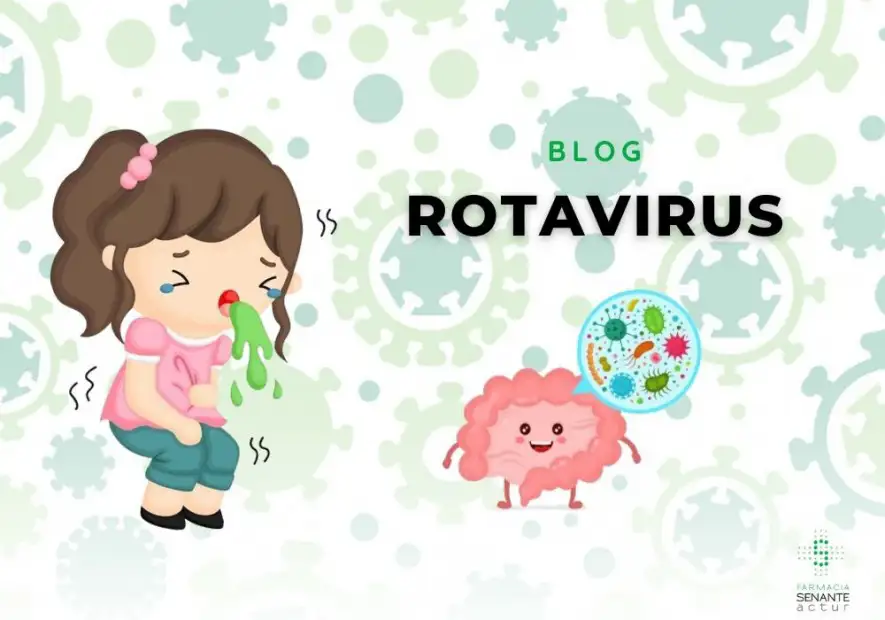

Infeksioni rotavirus (enteriti rotavirus) është një sëmundje që është shkaku më i zakonshëm i diarresë së rëndë, shpesh fatale, veçanërisht tek foshnjat dhe fëmijët e vegjël. Sipas Organizatës Botërore të Shëndetësisë (OBSH), rotavirusi është shkaku më i zakonshëm në botë i diarresë së rëndë dhe dehidratuese te fëmijët nën 5 vjeç, duke rezultuar në rreth 25 milionë njerëz që kërkojnë kujdes mjekësor çdo vit, dhe rreth 2 milionë shtrohen në spital.
Disa dekada më parë, askush nuk dinte për këtë sëmundje dhe njerëzit e sëmurë u diagnostikuan me gastroenterit. Zbulimi i rotavirusit lidhet me emrin e Ruth Bishop, e cila në vitin 1973 arriti të zbulojë grimcat virale në qelizat epiteliale të duodenit të pacientëve.
Pothuajse çdo fëmijë në botë nën moshën 5 vjeç është infektuar me rotavirus të paktën një herë. Rotavirusi është shkaktari më i zakonshëm i diarresë tek fëmijët nga 6 muaj deri në 4-5 vjeç në mbarë botën . Megjithatë, të rriturit gjithashtu mund të sëmuren. Në to, sëmundja zakonisht vazhdon në një formë të lehtë me simptoma më pak të theksuara. Përveç kësaj, kjo sëmundje mund të jetë epidemike në natyrë.
Rotavirusi është shumë ngjitës, ju mund të sëmureni pasi të keni futur në trup më pak se 100 grimca virusi. Rastet e riinfeksionit pas sëmundjes janë të mundshme.
Burimi i rotaviruseve është njeriu. Infeksioni ndodh nëpërmjet rrugës fekalo-orale, si drejtpërdrejt ashtu edhe gjatë kontaktit me sipërfaqet dhe objektet që mund të kontaminohen: lodra, dysheme, mobilje, rroba etj., si dhe gjatë ushqimit. Rotavirusi ruhet në fecesin e pacientit derisa të shfaqen simptomat dhe deri në 10 ditë pasi ato të zhduken, dhe në sipërfaqe dhe objekte për disa javë.
Edhe pse rruga fekalo-orale e transmetimit është më e zakonshme, rotavirusi mund të infektohet edhe nëpërmjet çdo kontakti me lëngjet trupore të një personi të sëmurë, për shembull, gjatë teshtitjes ose kontaktit me dorezat e derës ose lodrat që i sëmuri ka prekur.
Sëmundja regjistrohet gjatë gjithë vitit. Megjithatë, e veçanta e tij si gastroenterit viral është rritja e incidencës në periudhën e vjeshtës me rritje të mëtejshme në periudhën dimër-pranverë.
Simptomat e sëmundjes zakonisht shfaqen 2 ditë pas infektimit (edhe pse ndonjëherë periudha e inkubacionit mund të zgjasë deri në 5 ditë). Simptomat më karakteristike - të vjella dhe diarre - mund të zgjasin nga 3 deri në 8 ditë. Gjithashtu ndër simptomat e mundshme është një rritje e mprehtë e temperaturës së trupit, të përziera, dhimbje dhe murmuritje në stomak. Simptomat shtesë (humbja e oreksit, dehidratimi) mund të jenë veçanërisht të rrezikshme për foshnjat dhe fëmijët e vegjël. Të vjellat dhe diarreja mund ta bëjnë fëmijën tuaj të mos dëshirojë të hajë ose të pijë. Kjo mund të çojë në dehidrim, i cili është kërcënues për jetën: në këtë rast, fëmija mund të ketë nevojë për shtrimin urgjent në spital.
Simptomat e dehidrimit :
Metodat kryesore të parandalimit të infeksionit rotavirus janë vaksinimi dhe respektimi i rregullave të higjienës personale (larja e duarve pas vizitës në tualet dhe vendet publike, para ngrënies), si dhe rregullat e trajtimit të ushqimit dhe ujit. Sidoqoftë, respektimi i rregullave të higjienës personale, për fat të keq, nuk mjafton për të kontrolluar përhapjen e infeksionit rotavirus.
Nëse një infeksion rotavirus është zbuluar tashmë, atëherë njerëzit që kujdesen për pacientët duhet t'i trajtojnë ato me një antiseptik pasi të lajnë duart.
Lodrat dhe sipërfaqet e kontaminuara duhet të lahen me detergjent dhe trajtimi me një zgjidhje 70% të alkoolit etilik çaktivizon rotavirusin dhe parandalon transmetimin e tij të mëtejshëm.
Vaksina mbron foshnjat nga gastroenteriti rotavirus dhe nga zhvillimi i formave të rënda të sëmundjes. Organizata Botërore e Shëndetësisë (OBSH) rekomandon administrimin e dozës së parë të vaksinës rotavirus sa më shpejt të jetë e mundur pas moshës 6 javëshe. Në Ukrainë, vaksinimi kundër infeksionit rotavirus klasifikohet si i rekomanduar , domethënë, ju mund të vaksinoheni me shpenzimet tuaja. Për vaksinimin kundër infeksionit rotavirus, mund të përdoret një nga dy vaksinat e regjistruara në Ukrainë dhe në botë:
Rotarix (kursi përbëhet nga 2 doza: e para duhet të administrohet jo më herët se mosha 6 javë, e dyta - para mosha 24 javësh, intervali minimal ndërmjet dozave është 4 javë).
Rotatec (kursi përbëhet nga 3 doza: e para duhet të administrohet jo më herët se mosha 6 javë dhe jo më vonë se mosha 12 javë. Intervali ndërmjet dozave është të paktën 4 javë. Është e dëshirueshme që kursi i Vaksinimi, i cili përbëhet nga tre doza, përfundon përpara se fëmija të arrijë moshën 20-22 javëshe, nëse është e nevojshme, doza e tretë (e fundit) mund të administrohet deri në moshën 32 javëshe.
Të dyja vaksinat janë nga goja, pra administrohen si pika në gojë.
Vaksinat kundër infeksionit rotavirus janë shumë efektive : 9 nga 10 fëmijë të vaksinuar do të formojnë mbrojtje kundër një rrjedhe të rëndë të sëmundjes dhe 7 nga 10 fëmijë të vaksinuar do të mbrohen nga sëmundja e çdo ashpërsie.
OBSH thekson se përdorimi i vaksinave të rotavirusit duhet të jetë pjesë e një strategjie gjithëpërfshirëse për të kontrolluar sëmundjet diarreike me parandalim të shtuar (promovimi i ushqyerjes së hershme dhe ekskluzive me gji, larja e duarve me sapun, furnizimi i përmirësuar me ujë dhe kanalizimet).
